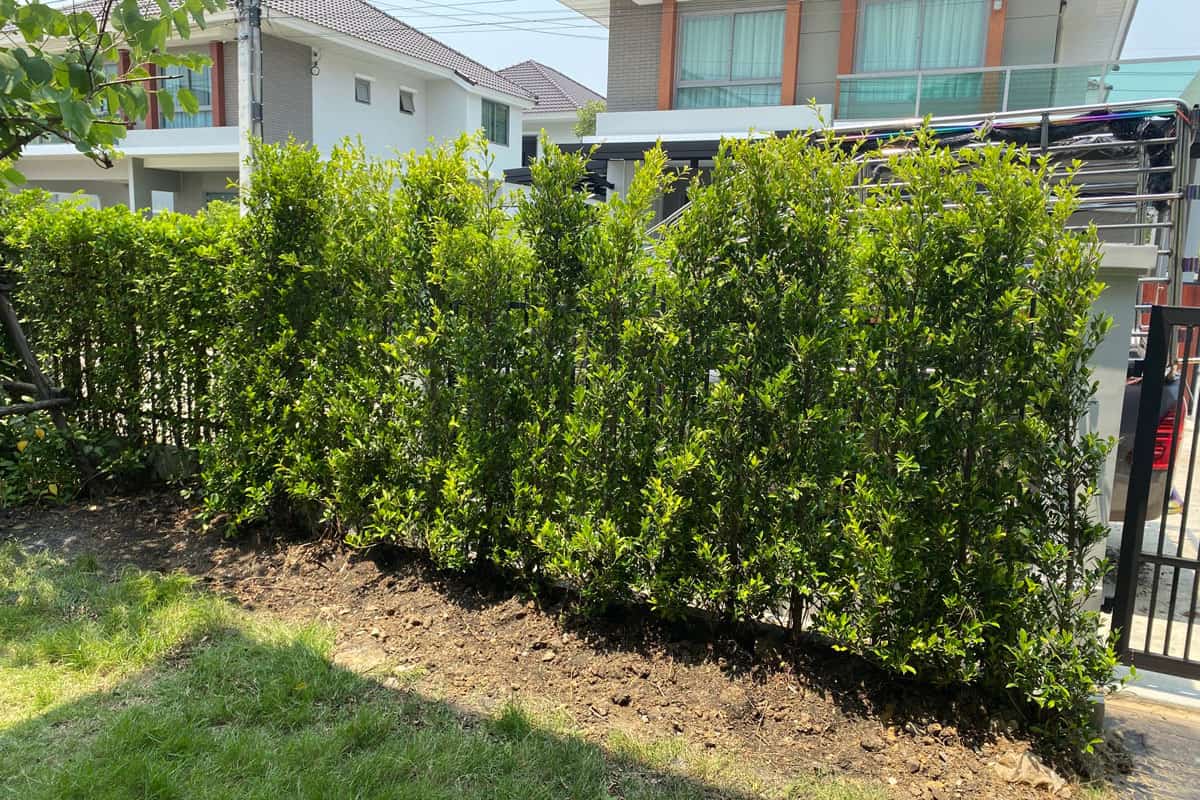Removing plants from your landscape can be tricky without the right strategy. For example, do you need to get rid of a ficus hedge but notice its roots are still in the soil? How do you remove ficus hedge roots from the ground? Can you pull them, or should you dig up the entire area?
Well, we've done plenty of searching and have the answer below.
Since ficus hedges have aggressive root systems, removing them can be difficult. However, one of the best ways to do this is to cut in toward the center of where your ficus hedge was and find the core of the root system.
From there, you can dig around the roots' central area, pulling them out in clumps. This will take patience, as ficus have extensive and invasive root systems. You may even want to apply an herbicide to the ground, which will help kill the smaller root sections.
As we start this article, we will cover ficus hedges and show you how to remove their roots. Whether you recently dug out a ficus hedge, have to get this done, or need other tips and tricks, we've got your back. With that said, let's dive right into this topic!

What Is The Best Way To Remove Ficus Roots?
Depending on the size of your ficus hedge, the root system may be extensive and hard to remove. One of the drawbacks to this plant species is that it has aggressive growing behaviors, making root removal a pain.
However, many gardeners have successfully removed ficus roots using a mix of chemicals and digging techniques. Generally, you want to locate the central area of your ficus's root system.
Even if you have already removed the ficus hedge, you only need to find the center of where the plant was growing. From there, you can dig a one-inch thick trench around the ficus's trunk/central stem.
If you don't want to dig an entire trench, we recommend going about six inches into the central portion of your ficus roots.

Then cut into that central area at a 45-degree angle. You want to try and grab the root ball of the ficus hedge, as this is the heart of the plant. You can push down between the surrounding sections of the root ball with a shovel, lifting portions of the root system.
Additionally, you may also want to apply an herbicide, like glyphosate, to the roots of a ficus hedge. This can help kill off the smaller roots, meaning less digging.
According to experts, using a product with glyphosate will help to kill the trunk and roots of a ficus hedge or tree, which both follow similar growing habits.
Can You Cut The Roots Of A Ficus?
Yes! If you need to remove ficus roots from the soil, cutting into them is a good way to get the ball rolling. As mentioned, you want to try digging a trench around your hedge's central portion.
Going in at a 45-degree angle into the center of the root ball of your ficus hedge will also help remove the main chunk left behind.
One of the main issues with removing ficus hedges and tree roots is their spread. Unfortunately, if your focus was older, its roots likely traveled many feet away from the main root ball, meaning a more tedious removal process.
Moreover, a ficus hedge may become invasive in certain instances, which means more rooting. Cutting through these roots will take time, so don't be afraid to take breaks between sections.
You can also control ficus roots near sidewalks and other structures by cutting them, so that's an idea for anyone not wanting to kill the hedge entirely.
Do Ficus Hedges Have Deep Roots?

Depending on the age of your ficus hedge, its roots can go deep into the ground. Generally, a ficus hedge will have roots about three feet into the soil.
However, if your hedge is older or doesn't have access to water, nutrients, and space, it could extend five to six feet. Because ficus hedges are essentially tamed, manicured ficus trees, their root systems will be almost identical.
One drawback is that a ficus tree and hedge will have aggressive, potentially invasive roots. So, if you had to remove your ficus hedge because of invasive behavior, you're not alone.
It's also worth mentioning that younger ficus hedges could have root systems that only extend a foot deep into the ground. So, removing all of the roots by hand or with a shovel won't be as challenging if you can tackle this issue early on.
Regardless, you want to remove the roots from your ficus in parts, focusing on the main root ball before anything else. Smaller roots will die on their own, sometimes not requiring removal.
How Wide Do Ficus Hedge Roots Grow?
Although this depends on how big your ficus becomes, it's possible to see its roots extend up to 50 feet in either direction. Of course, a ficus hedge usually has smaller, more manageable roots than a tree.
However, your ficus hedge can still become large, along with its root system. Since this species tends to lean invasive-growing, your plant's roots can be hard to control.
Therefore, it's more than possible for a ficus hedge's roots to extend 50 feet wide while only reaching about three feet deep in the soil.
One reason so many gardeners remove these plants is because of how expansive their roots grow. If you have plants nearby, your ficus hedge can take over their ground space and kill them.
It's generally best to leave at least a few feet between ficus hedges and 10-15 feet between it and other species. Since these are mainly used as privacy plants, you'll likely have multiple ficus root systems to remove if you get rid of all your hedges.
Should You Use Chemicals To Kill Ficus Hedge Roots?

If you don't want to do as much pulling, you can use chemicals to kill ficus roots. As mentioned, chemical products, including glyphosate, kill ficus hedge and tree root systems.
Even after pulling roots from the soil, smaller portions will likely be left behind. Therefore, using an herbicide to finish the job is a good final step in the process.
According to Northwest Arbor-Culture, you can spray chemicals like hexazinone or bromacil onto the soil above your remaining ficus roots and wait for them to seep into them.
These will find their way into the soil, attacking the existing ficus roots. Within a week or so, your soil should be filled with dead roots, which you can pull or wait to decompose naturally.
If it is going to rain in the next few days, that's also a great time to apply chemicals to kill ficus hedge roots. Try and get your product on the soil a day or two before the rain, which will wash them deeper into the ground when the storm arrives.
And on top of those ingredients, you might also want to keep an eye out for triclopyr. That is another effective chemical gardeners use to kill their ficus roots.
Can I Use Salt To Kill Ficus Roots?
Another way to remove ficus roots from your garden is by repeatedly applying salt to the soil. Typically, using salt on the roots of your hedge will cause them to shrivel up and die.
Rock salt, table salt, Epsom salts, and copper sulfate effectively kill leftover roots from your ficus hedge. They're potent enough to seep into your hedge's roots and destroy them from all angles.
However, when you do this, you need to be patient. Unlike a chemical you can apply once, salt requires repeated use. You might need to apply it every day for a week to see results, so don't get discouraged if this takes extra time.
Between using harsh chemicals and salt to kill ficus hedge roots, we think salt is better long-term. That's because most herbicides and their ingredients stay active in the soil for six+ months.
So, even if you killed the roots from your ficus hedge, whatever you try to plant next may have trouble growing. The ground essentially becomes sterile and unlivable for new plants.
Will A Ficus Grow Back After You Cut It Down?

No. Most times, your ficus will not be able to regrow after you cut it down to the ground. Although this is sometimes possible with other plant species, ficus will die if you severely prune it. Especially for smaller, manicured hedges, your ficus won't be able to fight against being removed and cut into.
However, the roots of your hedge will stay in the soil for a period after you kill a ficus hedge, which is why you need to remove them.
On top of that, applying an herbicide to the spot where your hedge grew from will block any further growth indefinitely.
Many chemicals work months after application, meaning your ficus will be gone for good. Some people don't like this while others do, so using chemicals versus digging the roots up manually will come down to your preference.
To Finish Up
Whether you have a ficus hedge you want to remove or already have, getting rid of the roots can be even more of a challenge. We found that the best way to remove ficus hedge roots is by digging a trench around the base of your shrub.
From there, you can pull your plant and its central root ball from the soil. The next step is to apply an herbicide with glyphosate or use a chemical like hexazinone or bromacil on the ground, allowing them to seep into the remaining roots and kill them.
Want to read more? Check out these helpful related garden articles below!
What Is The Best Fertilizer For Ficus Hedge?
